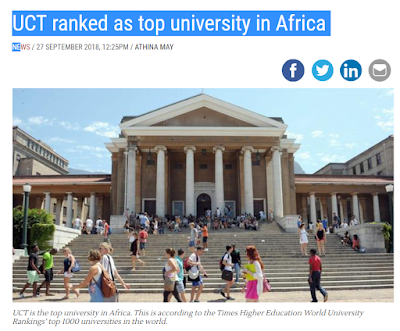The Journal of Student Affairs in Africa has just published its 12th issue!
Vol. 6(2) - which includes a number of research articles, reflective practice articles, and campus reports dealing with two pertinent matters: student psychological well-being on and off campus, as well as the psychological well-being of unemployed university graduates; and the assessment of quality in student affairs and services. In addition, the issue as always contains book reviews.
Here is the: Table of Contents. The issue can be downloaded, fully open access, from the website of the journal: www.jsaa.ac.za
Editorial Commentary
Towards Student Well‑being and Quality Services in Student Affairs in Africa
Thierry M. Luescher, Birgit Schreiber, Teboho Moja
Research Articles
Students’ Attitudes and Perceptions on Xenophobia: A Study of a University in Durban
Olubunmi Damilola Akande, Hilary Jephat Musarurwa, Sylvia Blanche Kaye
Psychological Health and Optimism amongst Unemployed Graduates in Zimbabwe
Julia Mutambara, Tinashe R. Makanyanga, Pilot Mudhovozi
First‑Year College Students’ Emotional Intelligence and Help-Seeking Behaviours as Correlates of their Academic Achievement
Melese Astatke
Student Satisfaction Regarding Service Quality at Ethiopian Public Higher Education Institutions: A Case Study
Solomon L. Lodesso, Eldridge J. van Niekerk, Cecelia A. Jansen, Hélène Müller
Reflective Practice
Quality Enhancement in Student Affairs and Social Justice: A Reflective Case Study from South Africa
Thierry M. Luescher
Who Are Our First‑Year At‑Risk Humanities Students? A Reflection on a First‑Year Survey Administered by the Wits Faculty of Humanities Teaching and Learning Unit in 2015 and 2016
Genevieve Hundermark
Holistic Health, Disadvantage, Higher Education Access and Success: A Reflection
Angela A. Morris-Paxton, Johanna M. van Lingen, Diane Elkonin
Campus Report
IASAS NASPA: 4th Global Summit on Student Affairs and Services
Tiki Ayiku, Lisa Bardill-Moscaritolo, Stephanie Gordon, Brett Perozzi, Birgit Schreiber
SAFSAS Summit 2018: Looking Back, Looking Forward: Understanding Our Space In and Role In the New Normal
Saloschini Pillay, Birgit Schreiber, Sibusiso Chalufu
Mental Health at Universities: Universities are Not In Loco Parentis – Students are Active Partners in Mental Health
Birgit Schreiber
Book Reviews
Clarence, S. & Dyson, L. (Eds.). (2017). Writing Centres in Higher Education: Working in and across disciplines. Stellenbosch, South Africa: African Sun Media
Annsilla Nyar
Jansen, J. (2017). As By Fire: The End of the South African University. Pretoria, South Africa: Tafelberg Publishers
Vicki Trowler
Vol. 6(2) - which includes a number of research articles, reflective practice articles, and campus reports dealing with two pertinent matters: student psychological well-being on and off campus, as well as the psychological well-being of unemployed university graduates; and the assessment of quality in student affairs and services. In addition, the issue as always contains book reviews.
Here is the: Table of Contents. The issue can be downloaded, fully open access, from the website of the journal: www.jsaa.ac.za
Editorial Commentary
Towards Student Well‑being and Quality Services in Student Affairs in Africa
Thierry M. Luescher, Birgit Schreiber, Teboho Moja
Research Articles
Students’ Attitudes and Perceptions on Xenophobia: A Study of a University in Durban
Olubunmi Damilola Akande, Hilary Jephat Musarurwa, Sylvia Blanche Kaye
Psychological Health and Optimism amongst Unemployed Graduates in Zimbabwe
Julia Mutambara, Tinashe R. Makanyanga, Pilot Mudhovozi
First‑Year College Students’ Emotional Intelligence and Help-Seeking Behaviours as Correlates of their Academic Achievement
Melese Astatke
Student Satisfaction Regarding Service Quality at Ethiopian Public Higher Education Institutions: A Case Study
Solomon L. Lodesso, Eldridge J. van Niekerk, Cecelia A. Jansen, Hélène Müller
Reflective Practice
Quality Enhancement in Student Affairs and Social Justice: A Reflective Case Study from South Africa
Thierry M. Luescher
Who Are Our First‑Year At‑Risk Humanities Students? A Reflection on a First‑Year Survey Administered by the Wits Faculty of Humanities Teaching and Learning Unit in 2015 and 2016
Genevieve Hundermark
Holistic Health, Disadvantage, Higher Education Access and Success: A Reflection
Angela A. Morris-Paxton, Johanna M. van Lingen, Diane Elkonin
Campus Report
IASAS NASPA: 4th Global Summit on Student Affairs and Services
Tiki Ayiku, Lisa Bardill-Moscaritolo, Stephanie Gordon, Brett Perozzi, Birgit Schreiber
SAFSAS Summit 2018: Looking Back, Looking Forward: Understanding Our Space In and Role In the New Normal
Saloschini Pillay, Birgit Schreiber, Sibusiso Chalufu
Mental Health at Universities: Universities are Not In Loco Parentis – Students are Active Partners in Mental Health
Birgit Schreiber
Book Reviews
Clarence, S. & Dyson, L. (Eds.). (2017). Writing Centres in Higher Education: Working in and across disciplines. Stellenbosch, South Africa: African Sun Media
Annsilla Nyar
Jansen, J. (2017). As By Fire: The End of the South African University. Pretoria, South Africa: Tafelberg Publishers
Vicki Trowler




















